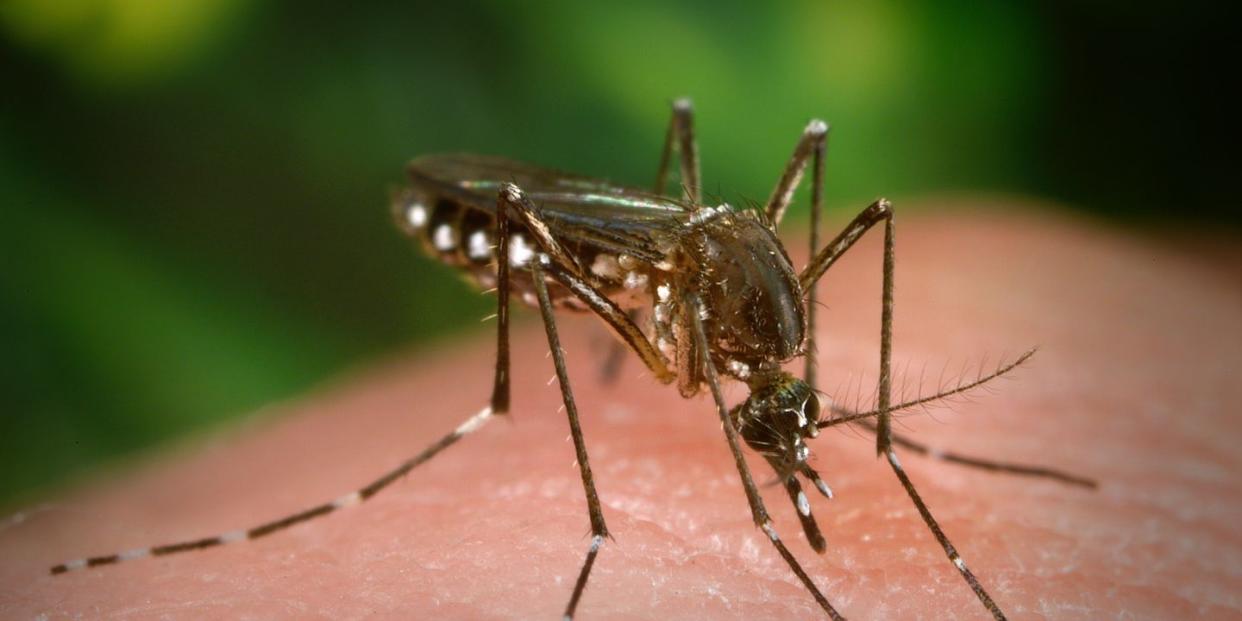A Mosquito-Borne Illness That Kills Over 30% of Those Infected Could Spike This Summer

Mosquitos are the deadliest animals in the world and have taken thousands of lives through illnesses like malaria, West Nile, Zika, and more.
As the weather gets warmer, health officials are warning about Eastern Equine Encephalitis (EEE), a rare disease that can cause an inflammation of the brain. The number of cases in the United States spiked from six to 38 between 2018 and 2019.
The disease kills 30% percent of those infected. Those who survive may still live with neurological disabilities.
Climate change, increased rainfall, and travel can contribute to the increased number of cases of the disease.
There is no vaccine for EEE; the best way to prevent the disease is to prevent mosquito bites.
As if a global pandemic wasn't enough to worry about, the warmer weather has signaled the return of the mosquitos. Usually the worst a mosquito can do is leave you with itchy welts. However, we must not forget that the Center for Disease Control and Prevention (CDC) named mosquitos the deadliest animals in the world for a reason. In 2017 alone, the mosquito-borne disease malaria lead to 435,000 deaths. Others like dengue, West Nile, yellow fever, and Zika have also continued to take lives over the years. And now, health officials are warning about another disease on the rise: Eastern Equine Encephalitis (EEE).
EEE virus is a rare cause of brain infections, according to the CDC. Approximately 30% of people with EEE die and many survivors have ongoing neurologic problems. Usually, there are only a few cases in the United States each year, however, there was an alarming spike between 2018 and 2019. While 2018 saw six cases, 2019 saw 38 cases and 15 of the individuals infected died. These cases were mostly reported in Massachusetts (12 cases) and Michigan (10 cases). However, Connecticut and New Jersey both had four cases, while Rhode Island had three. Alabama, Georgia, Indiana, North Carolina, and Tennessee each reported one case. While EEE usually hits the Atlantic and Gulf Coast states, last year's cases were more scattered and popped up in new areas, ultimately raising concerns about EEE's trajectory in 2020.
This major jump in cases last year has caused some fear among health officials. Joe Conlon, a retired U.S. Navy entomologist and spokesman for the American Mosquito Control Association, spoke with TODAY about the current threat of EEE. He explains that the fate of 2020 depends on rainfall amounts and temperatures, as more rainfall and higher temperatures can increase the risk of the disease. "It would be prudent to remain vigilant and make preparations for at least the same levels as last year," he says.
"Mosquito season is just beginning to enter its peak time frame and mosquito control districts have been assiduously preparing for this the entire spring. It’s what they do," he says. However, due to the pandemic, he admits people may be juggling with ‘health emergency fatigue’ and aren't prioritizing the risk of mosquito-borne diseases as heavily.
How does EEE spread?
The virus almost exclusively grows in birds that live in swamps, writes the CDC. However, certain mosquito types can feed on both birds and mammals. If this mosquito bites an infected bird, it can then transmit the virus to mammals such as animals (most notably horses) and humans.
The illness typically lasts one to two weeks and is characterized by fever, chills, malaise, arthralgia, and myalgia. Most people recover completely when there is no central nervous system involvement. But in severe cases, the disease may contribute to encephalitis or a rare inflammation of the brain tissue. Symptoms of encephalitis include fever, headache, vomiting, diarrhea, seizures, behavioral changes, drowsiness, and coma.
Warmer temperatures as well as travel play a role in facilitating this disease. A study from the Yale School of Forestry & Environmental Studies predicted that by 2050, climate change will expose half of the world's population to disease-spreading mosquitos.
How do you prevent EEE?
There is currently no vaccine for EEE. As per the CDC's recommendation, the best way to prevent the disease is to prevent mosquito bites. As mosquitos can bite at all hours, use insect repellent, wear long-sleeves clothes, treat your clothing and gear, and take action to minimize mosquitoes indoors and outdoors.
Last month, lawn care company TruGreen, released its 2020 list of cities with the most bugs, which also noted the top cities for mosquitos. Here are dome additional tips the company shared on eliminating mosquitos in your yard.
Remove or simply replace water that may accumulate in things like buckets and birdbaths. These moist locations attract mosquitos, as this is where they often lay their eggs.
Make sure your lawn is free from piles of branches, twigs, or leaves. Mosquitos like to hide in these places.
Try planting mosquito-repelling herbs in your garden, such as citronella, basil, or lavender.
You can check out the CDC's resources on Eastern Equine Encephalitis (EEE) here. But for now, keep those limbs covered when outdoors and consider picking up protective gear, like this top-rated mosquito repeller, which will keep those ferocious fliers away from you for up to 12 hours.
Follow House Beautiful on Instagram.
You Might Also Like

